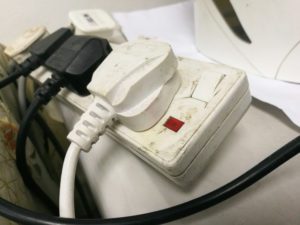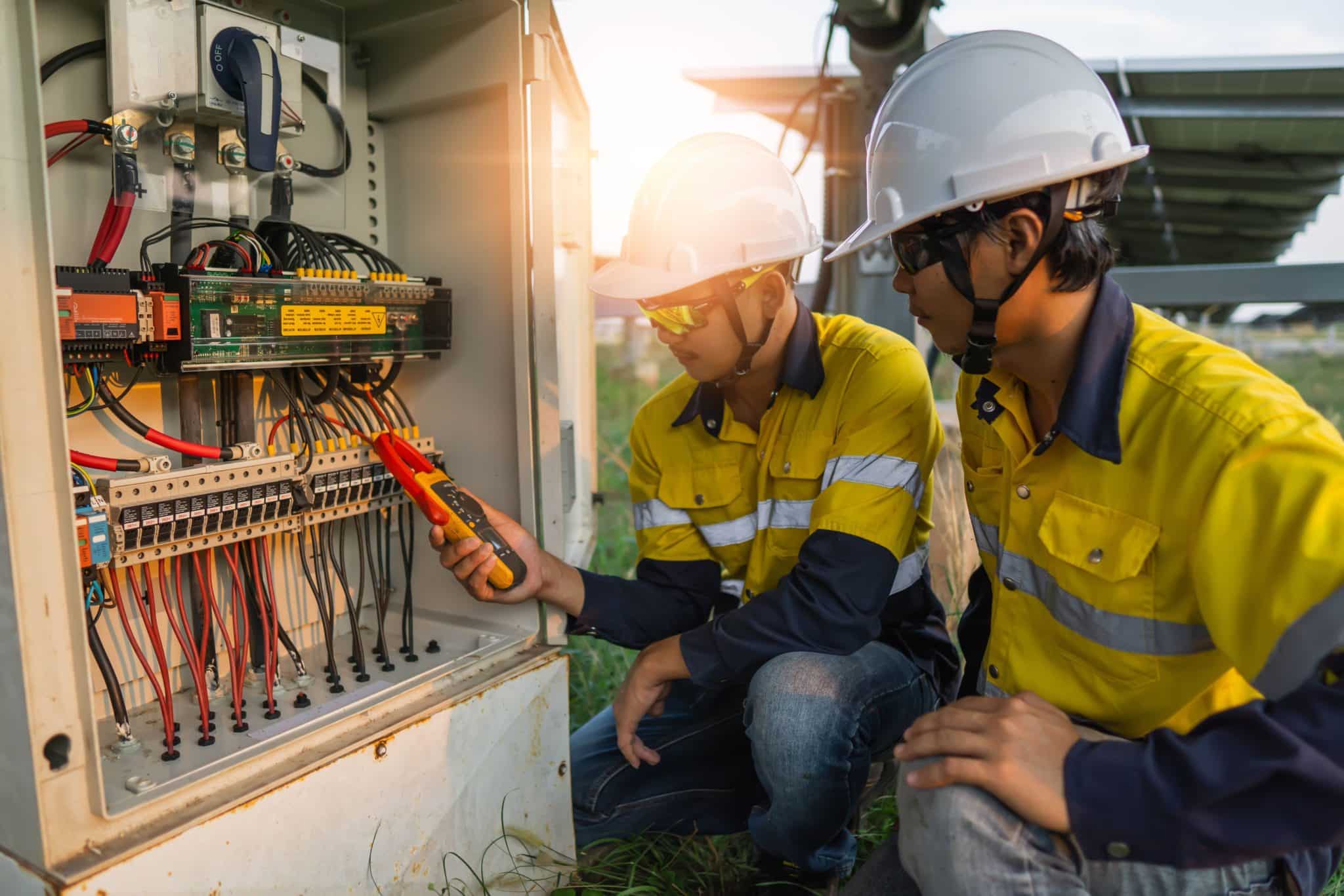Electrical accidents can happen on any job site and are often deadly.
These accidents can wreak havoc on your electrical business, especially if word gets out about them.
This article will discuss some of the most common causes of electrical accidents on the job site and how you can prevent them!
Common Electrical Hazards on a Job Site

Workplace safety is always important, but it’s especially crucial when electricity is involved.
According to the ESFI (Electrical Safety Foundation International) there are over 2,000 electrical accidents in the workplace every year, some of which are fatal. Many of these accidents could be prevented if more care and attention were paid to electrical safety on the job site.
Let’s take a look at some of the most common electrical hazards on a job site and how you can avoid them.
Faulty Electrical Design
One of the most common causes of electrical accidents on the job site is faulty electrical design.
This can include things like:
- wiring that is not up to code
- using the wrong type of wire for a particular application
- not using proper insulation or using staples to attach wires to framing members
Faulty electrical design can cause a fire or electrocution. Be on the look out for flickering lights, or constantly tripping circuit breakers, as these can indicate faulty wiring.
Equipment Malfunction
Another common cause of electrical accidents is equipment malfunction.
Equipment that is old, heavily used, or poorly maintained is at risk of malfunctioning and causing an accident.
Be sure to inspect all electrical equipment before using it, and do not use any equipment that appears to be damaged or in poor condition.
Wet Areas
It is common knowledge that water and electricity are a bad mix.
Yet, every year there are countless electrical accidents caused by wet areas on the job site.
Always be sure to avoid using electrical equipment in wet or damp areas, and be extra careful if you must use electrical equipment in these areas.
Wiring Damage
Wiring damage is another common cause of electrical accidents.
This can be caused by a number of things, including: animals chewing on wires, exposure to the elements, or simply wear and tear over time
Any time you are working with electrical wiring, be sure to inspect it for damage before proceeding.
Overloaded Circuits

An overloaded circuit happens when too much electricity is flowing through a wire, causing it to overheat and catch fire.
This can be caused by:
- too many appliances plugged into one outlet
- a faulty appliance that is drawing too much power
- a circuit that is not rated for the amount of electricity it is carrying
Overloaded circuits are one of the leading causes of electrical fires.
To prevent an overloaded circuit, be sure to plug only one appliance into each outlet and do not exceed the amperage rating of the circuit.
Exposed Wiring
Exposed wiring is another major hazard on the job site.
This can happen when wires are not properly protected or when they are damaged, exposing the live wire inside.
Be sure to always cover exposed wires with electrical tape or a similar material.
Ways To Prevent Electrical Accidents on the Job Site

You’re familiar with some common causes of electrical accidents in the workplace, but how do you put that knowledge to use?
Here are some tips and tricks you can put into action to help you prevent electrical accidents on the job site.
Complete a Detailed Job Plan
Before beginning any electrical work, be sure to complete a detailed job plan.
This should include a materials list, as well as a step-by-step guide of the work that needs to be done.
By taking the time to plan out your work ahead of time, you can avoid making mistakes that could lead to an accident.
Select the Best PPE
Depending on the job, you just might not be able to avoid using electrical equipment in wet or otherwise dangerous areas, that’s why PPE (Person Protection Equipment) for you and your team is so important.
When working in wet or damp areas, be sure to use PPE such as:
- Rubber gloves
- Non-conductive mats
- Circuit breaking safety devices such as ground fault circuit interrupters (GFCI)
The right PPE can help to prevent electrical accidents, even in the most dangerous of situations.
Identify Energy Sources
Before beginning any work, be sure to locate and identify all energy sources in the area.
This includes:
- Generators
- Power lines
- Electrical outlets
- Exposed live wires
By taking the time to identify all potential energy sources, you can avoid coming into contact with them and accidentally causing an electrical accident.
Know all the Safety Requirements
Safety is not one size fits all. Different equipment requires different safety requirements.
Be sure to consult the owner’s manual or manufacturer of any equipment you will be using to find out what safety requirements need to be met.
This is especially important when using new or unfamiliar equipment.
Be sure to familiarize yourself with these requirements before beginning any work, as failure to do so could result in an accident.
Understand OSHA
The Occupational Safety and Health Administration (OSHA) is an administration created by Congress to ensure the health and safety of workers in The United States.
OSHA has a set of laws and regulations that must be followed in order to ensure a safe work environment, including regulations for electrical jobs.
Be sure to familiarize yourself with these regulations and make sure you are following them on the job site, as this is one of the best ways to prevent electrical accidents on a job site.
Let The Pros Handle It
There are some electrical jobs that are simply too dangerous for the average person to handle.
If you find yourself in over your head, don’t be afraid to call in a professional. There is no shame in admitting that you need help, and it is better to be safe than sorry.
Contact an electrical contracting company for assistance with any electrical jobs that you are not comfortable handling yourself.
Key Takeaways:
- Preventing electrical accidents on a job site is important for the safety of you and your team.
- Complete a detailed job plan before beginning any work to help prevent accidents.
- Select the proper PPE for the job and make sure you understand all safety requirements before beginning any work.
- Familiarize yourself with OSHA regulations to help prevent electrical accidents on a job site.
- If you are ever in doubt, don’t hesitate to call in a professional. Preventing accidents is always the number one priority.
Conclusion
Electrical accidents are serious business and can easily be prevented by following some simple safety tips.
By taking the time to plan your work, select the proper PPE, identify energy sources, and understand OSHA regulations, you can help to prevent electrical accidents on the job site.
Remember, safety is always the number one priority. If you have any doubts about your ability to complete a job safely, it is better to call in a professional than to try and do it yourself.
What other tips do you have for preventing electrical accidents on the job site? Share them with us in the comments below!


